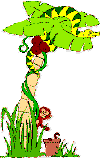...inicio...
Presentación
CURSO de Aprendizaje
Gramática
Listening
Libros
Lecturas
Programas
Ejercicios
Práctica
Recursos
y Actividades
Vocabulario
Teachers
First Certificate
Enlaces
Tablón de Anuncios
Servicios
Chat
Diccionario
Traducción
| Ahora
puedes tener La Mansión del Inglés en CD Rom |
| - ··· - |
| Consigue más de 150 programas Freeware y Shareware para mejorar tu Inglés |
Lee el texto
It was seven o'clock of a very warm evening in the Seeonee hills when Father Wolf woke up from his day's rest, scratched himself, yawned, and spread out his paws one after the other to get rid of the sleepy feeling in their tips. Mother Wolf lay with her big gray nose dropped across her four tumbling, squealing cubs, and the moon shone into the mouth of the cave where they all lived.
"Augrh!" said Father Wolf. "It is time to hunt again." He
was going to spring down hill when a little shadow with a bushy tail crossed the
threshold and whined: "Good luck go with you, O Chief of the Wolves. And
good luck and strong white teeth go with noble children that they may never
forget the hungry in this world."
little shadow with a bushy tail crossed the
threshold and whined: "Good luck go with you, O Chief of the Wolves. And
good luck and strong white teeth go with noble children that they may never
forget the hungry in this world."
It was the jackal--Tabaqui, the Dish-licker--and the wolves of India despise Tabaqui because he runs about making mischief, and telling tales, and eating rags and pieces of leather from the village rubbish-heaps. But they are afraid of him too, because Tabaqui, more than anyone else in the jungle, is apt to go mad, and then he forgets that he was ever afraid of anyone, and
runs through the forest biting everything in his way. Even the tiger runs and hides when little Tabaqui goes mad, for madness is the most disgraceful thing that can overtake a wild creature. We call it hydrophobia, but they call it dewanee--the madness-- and run.
"Enter, then, and look," said Father Wolf stiffly, "but there is no food here."
"For a wolf, no," said Tabaqui, "but for so mean a person as myself a dry bone is a good feast. Who are we, the Gidur-log [the jackal people], to pick and choose?" He scuttled to the back of the cave, where he found the bone of a buck with some meat on it, and sat cracking the end merrily.
"All thanks for this good meal," he said, licking his lips.
"How beautiful are the noble children! How large are their eyes!
And so young too! Indeed, indeed, I might have remembered that the children of kings are men from the beginning."
Now, Tabaqui knew as well as anyone else that there is nothing so unlucky as to compliment children to their faces. It pleased him to see Mother and Father Wolf look uncomfortable.
Tabaqui sat still, rejoicing in the mischief that he had made, and then he said spitefully:
"Shere Khan, the Big One, has shifted his hunting grounds. He will hunt among these hills for the next moon, so he has told me."
Shere Khan was the tiger who lived near the Waingunga River, twenty miles away.
"He has no right!" Father Wolf began angrily--"By the Law of the Jungle he has no right to change his quarters without due warning. He will frighten every head of game within ten miles, and I--I have to kill for two, these days."
"His mother did not call him Lungri [the Lame One] for nothing," said Mother Wolf quietly. "He has been lame in one foot from his birth. That is why he has only killed cattle. Now the villagers of the Waingunga are angry with him, and he has come here to make our villagers angry. They will scour the jungle for him when he is far away, and we and our children must run when the
grass is set alight. Indeed, we are very grateful to Shere Khan!"
"Shall I tell him of your gratitude?" said Tabaqui.
"Out!" snapped Father Wolf. "Out and hunt with thy master. Thou hast done harm enough for one night."
"I go," said Tabaqui quietly. "Ye can hear Shere Khan below in the thickets. I might have saved myself the message."
Father Wolf listened, and below in the valley that ran down to a little river he heard the dry, angry, snarly, singsong whine of a tiger who has caught othing and does not care if all the jungle knows it.
"The fool!" said Father Wolf. "To begin a night's work with that noise! Does he think that our buck are like his fat Waingunga bullocks?"
"H'sh. It is neither bullock nor buck he hunts to-night," said Mother Wolf. "It is Man."
The whine had changed to a sort of humming purr that seemed to come from every quarter of the compass. It was the noise that bewilders woodcutters and gypsies sleeping in the open, and makes them run sometimes into the very mouth of the tiger.
Contesta las siguientes preguntas de comprensión
Choose the best answer, a), b) or c)
1. Father Wolf woke up because 2. Tabaqui the jackal is 3. Tabaqui found a bone in the cave and thanked the wolves by |
© Copyright 2001 Craig Wealand & Domingo Blanco - Todos los Derechos Reservados. -